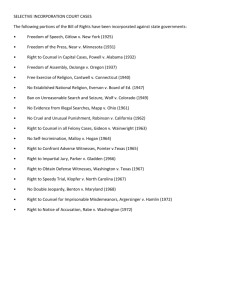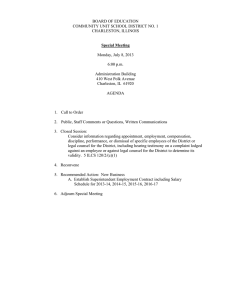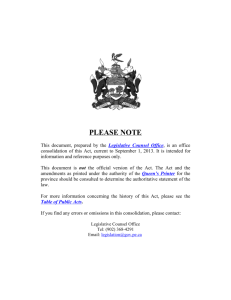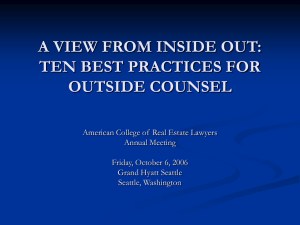Page 1 of 3 ETHICS OPINION 537
advertisement
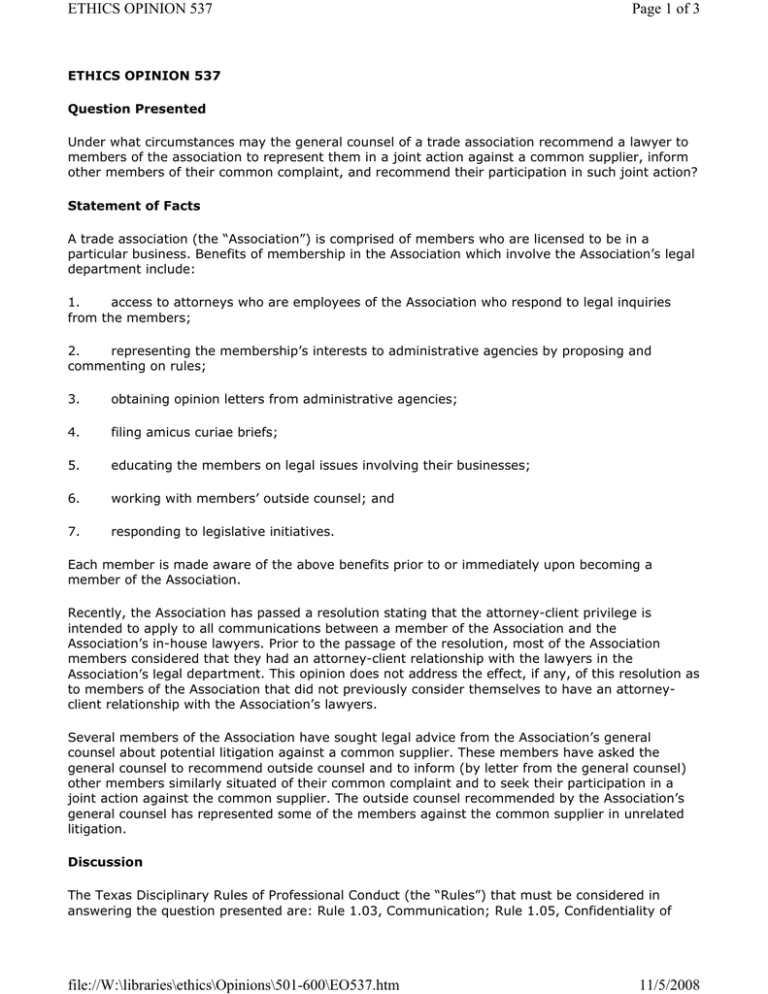
ETHICS OPINION 537 Page 1 of 3 ETHICS OPINION 537 Question Presented Under what circumstances may the general counsel of a trade association recommend a lawyer to members of the association to represent them in a joint action against a common supplier, inform other members of their common complaint, and recommend their participation in such joint action? Statement of Facts A trade association (the “Association”) is comprised of members who are licensed to be in a particular business. Benefits of membership in the Association which involve the Association’s legal department include: 1. access to attorneys who are employees of the Association who respond to legal inquiries from the members; 2. representing the membership’s interests to administrative agencies by proposing and commenting on rules; 3. obtaining opinion letters from administrative agencies; 4. filing amicus curiae briefs; 5. educating the members on legal issues involving their businesses; 6. working with members’ outside counsel; and 7. responding to legislative initiatives. Each member is made aware of the above benefits prior to or immediately upon becoming a member of the Association. Recently, the Association has passed a resolution stating that the attorney-client privilege is intended to apply to all communications between a member of the Association and the Association’s in-house lawyers. Prior to the passage of the resolution, most of the Association members considered that they had an attorney-client relationship with the lawyers in the Association’s legal department. This opinion does not address the effect, if any, of this resolution as to members of the Association that did not previously consider themselves to have an attorneyclient relationship with the Association’s lawyers. Several members of the Association have sought legal advice from the Association’s general counsel about potential litigation against a common supplier. These members have asked the general counsel to recommend outside counsel and to inform (by letter from the general counsel) other members similarly situated of their common complaint and to seek their participation in a joint action against the common supplier. The outside counsel recommended by the Association’s general counsel has represented some of the members against the common supplier in unrelated litigation. Discussion The Texas Disciplinary Rules of Professional Conduct (the “Rules”) that must be considered in answering the question presented are: Rule 1.03, Communication; Rule 1.05, Confidentiality of file://W:\libraries\ethics\Opinions\501-600\EO537.htm 11/5/2008 ETHICS OPINION 537 Page 2 of 3 Information; Rule 1.06(b)-(f), Conflict of Interest: General Rule; Rule 1.07, Conflict of Interest: Intermediary; Rule 1.12, Organization as a Client; Rule 2.01, Advisor; Rule 7.02, Communications Concerning a Lawyer’s Service; Rule 7.03, Prohibited Solicitations and Payments; Rule 7.05, Prohibited Written Solicitations; Rule 7.06, Prohibited Employment; Rule 7.07, Filing Requirements for Public Advertisements and Written Solicitations; and Rule 8.04, Misconduct. Prior opinions with possible application are: Opinion 178, May 1958, Opinion 346, June 1969, and Opinion 446, May 1987, but none is controlling under the above facts. Opinion 178 involved lawyers’ acceptance of employment from a lay intermediary organization (an Automobile Association) to perform legal services to its members, which the organization had agreed to provide or pay for. The lawyers were not employed by the association to represent its members on matters of collective interest to its members as a whole, but for the purpose of advising the members of the association in respect of their individual affairs and of handling matters affecting only the individual member. The conduct of the lawyers was held improper because the organization in effect held itself out to furnish legal services to its members and “(b)y reason thereof attorneys accepting employment through such Association to perform such services are permitting their professional services to be used in aid of the practice of law by a lay intermediary in violation of Canon 43.” Opinion 346, June 1969, was decided under the solicitation rules then in existence and held it was improper for a lawyer to allow an association or group to advertise to the members of the association or group that the lawyer was competent and qualified and would advise them on their personal legal problems, which had no relation to the work, occupation, or profession of the members of the association or group. Opinion 446, May 1987, held that no violation of the disciplinary rules results from a lawyer allowing a financial planning organization to recommend him to a member of the organization who has no lawyer or accepting payment for part or all of his fee for services related to a member. As a general proposition, an organization composed of voluntary members with a common interest, such as occupation, business, or employment, can recommend lawyers to its membership so long as the legal work to be performed pertains to such common interest. The proposed advice, recommendation, and contact of members by the general counsel of the trade association pertains to the common interest of the members and not to their individual affairs and affecting only the individual members. Under the facts stated, Rule 7.03, Prohibited Solicitations and Payments, does not prohibit the Association’s general counsel from personally or by telephone contacting members of the trade association he represents and informing them of the litigation proposed by some of its members. The facts do not indicate the general counsel will receive any pecuniary benefit from his recommendation of outside counsel. Other members, and not outside counsel, have requested him to contact members similarly situated. Likewise, Rule 7.05, Prohibited Written Solicitations, does not prohibit the general counsel, at the request of some members of the Association, from contacting by letter other members of the Association and providing them with information about the proposed litigation and his recommendation of an outside lawyer. In communicating with members and in making recommendations to them, the Association’s general counsel must comply with the requirements of Rule 1.03, regarding communications with clients, Rule 1.05, Confidentiality of Information, Rule 1.06(b)(f), Conflicts of Interest, Rule 1.07, Conflict of Interest: Intermediary, and Rule 1.12, Organization as a Client. Additionally, as required by Rule 2.01 (in the case of advice to association members with which an attorney-client relationship exists), the general counsel must exercise independent professional judgment and render candid advice regarding the pursuit of the proposed litigation and the selection of outside counsel. In recommending outside counsel, the general counsel must also comply with the file://W:\libraries\ethics\Opinions\501-600\EO537.htm 11/5/2008 ETHICS OPINION 537 Page 3 of 3 requirements of Rule 7.02 regarding communications concerning a lawyer’s services. In contacting a member who has not sought the advice of the Association’s general counsel concerning the proposed litigation and the outside lawyer, the general counsel should explain the matter to the extent reasonably necessary to permit the member to make informed decisions regarding participating in such litigation and the employment of the lawyer recommended by him to handle such litigation. A mere perfunctory recommendation that members employ outside counsel and join in the litigation would not meet the requirements of Rule 1.03, which applies in the case of members of the Association for which there already exists an attorney-client relationship with the Association’s general counsel. Under the facts stated, several members of the Association, acting on their own behalf and not on behalf of the outside counsel, requested the Association’s general counsel to contact other members of the Association to inform them of the anticipated litigation and the general counsel’s recommendation of outside counsel. If, however, the general counsel’s contact of members is made on behalf of or at the request of the outside counsel (either directly or indirectly through one or more members of the Association), or if the general counsel is to receive any compensation for recommending outside counsel in the matter, the proposed communication to Association members by the general counsel, viewed as acting in this case on behalf of the outside counsel, must also comply with the requirements of Rules 7.03, 7.05, and 7.07. These rules, which govern solicitation by a lawyer directed to persons who are not the lawyer’s clients, would apply to all communications by the Association’s general counsel made on behalf of the outside counsel to Association members who are not already clients of the outside counsel. Moreover, Rules 7.06 and 8.04 would prohibit the outside counsel from accepting employment if the Association’s general counsel failed to comply with Rules 7.02, 7.03, 7.05, and 7.07 when acting on behalf of the outside counsel. Conclusion Under the facts set out above, no violation of the Texas Disciplinary Rules of Professional Conduct results from a trade association’s general counsel, at the request of some of the association’s members, recommending competent and qualified outside counsel to represent association members in proposed litigation against a common supplier, or in informing members that other members have employed such outside counsel in the matter, if the general counsel otherwise complies with the requirements of the Rules relating to communications with clients, confidentiality of client information, conflicts of interest, acting as an intermediary between clients, and obligations to an organization that is a client. If the association’s general counsel were acting on behalf of the outside counsel in making the communications to association members concerning the litigation and proposed employment of the outside counsel, the general counsel’s communications would be subject to the additional requirements of the Rules applicable to solicitation communications by lawyers. file://W:\libraries\ethics\Opinions\501-600\EO537.htm 11/5/2008

